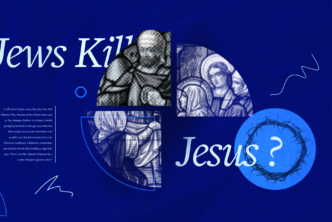Today’s guest post is by Jon Ng, ministry director of Rising Hope Street Ministry. Rising Hope seeks to address the immediate and long-term needs of homelessness through hunger-relief, authentic community, friendship, and care. In 2014, Jon was also an intern at Faithlife.
It was a warm summer night when I stood on my balcony, looking up at the stars. Dread and stress pulled at my heart, but for a moment, I had peace. At 24 years old, I was leading worship, volunteering in four other church ministries, working a full-time job, and going to school full-time. I was actively sharing Christ in every area of life—even at work, where my job was on the line.
I thought I was doing everything right to please God. Still, I felt like I was missing something in my walk with Christ. God felt distant, and I became more and more restless in my pursuit for greater intimacy with him.
Why did it seem like God was shrinking away when I was more active than ever in my faith?
Years ago, God rescued me in a full-blown “Saul-to-Paul” conversion. After four years of drug abuse and being part of a gang, I accepted Jesus Christ as Lord and went on to serve as a missionary for two years in a First Nations reservation in the Northwest Territories of Canada. I went to Bible college and returned to work as a caretaker in a nursing home while studying to become a nurse.
Over the years, I studied my Bible from cover to cover, listened to the latest sermon podcasts, and served in as many positions as I could at church. But something was missing. It felt like none of my efforts brought me any closer to God.
So one night, I opened my Bible and began reading through Hebrews 11—the faith chapter. As I began to read verse five, God highlighted the story of Enoch in a way that changed my life forever.
“By faith Enoch was taken up so that he should not see death, and he was not found, because God had taken him. Now before he was taken he was commended as having pleased God” (Hebrews 11:5).
How can someone’s life be summarized, “as having pleased God”? He pleased the God of the universe—so much that he was taken up without suffering death. Twice in Genesis 5, Enoch is described as a man who “walked with God.” I coveted Enoch’s relationship with God, and so I stepped out onto my balcony that warm summer night and prayed:
“Father God, I want to have the same kind of amazing friendship that Enoch had with You. I want to be known for walking with you, pleasing you. Please show me what I am missing—what am I overlooking in Scripture? Help me obey you in all the ways that bring you joy.”
For the next few days, every time I opened my Bible, every chapter I read was about the poor. It started freaking me out. Even the podcasts I listened to were speaking about the poor. Tim Keller, Francis Chan, David Platt, and even pastors from my local church. It was as if everyone was chanting the same message over and over—caring for the poor is a biblically mandated responsibility for the Church.
At the time, my friends and I had distorted pictures of the poor. I saw helping the poor as doing them a “favor.” My friends either felt like helping the local poor wasn’t their calling, or that the “real poor” were overseas in third-world countries. Both groups were guilty of ignoring the pain and suffering at our doorstep.
After extensive research and seeking counsel from local pastors, I discovered that with the exception of God himself, the poor are the most talked about subject in all of Scripture. The Bible speaks on the poor, the widowed, and the destitute about 3,000 times. And yet, even with a few years of missionary work under my belt, Bible college training, and being an active member of my church, I never saw it.
How in the world did I miss this?
In Isaiah 58:1–14, God outright invalidates the prayers and fasting of those who ignore the poor, but promises to hear the cries of those who help the poor.
1 John 3:16-17 states that the way I help others with material goods is indicative of the very love of God in me.
Proverbs 21:13 warns us that we too will be ignored by God if we ignore the cry of the poor.
Jesus Christ and John the Baptist were homeless.
Matthew 25:34-46 says taking care of the poor is the same as taking care of Jesus and neglecting the poor is the same as neglecting Jesus.
The Bible promises blessings to those who love the “least of these” (Matthew 25:34–40).
In Job 29:1–25, Job attributes all of his success, blessings, and joy in life to loving and befriending the poor, the needy, and the victims of injustice.
There is a clear, consistent message whenever the Bible mentions the poor: helping them is not optional. It’s a requirement for a healthy and fulfilling life of following and emulating Christ.
That’s what I was missing. God deeply loves and cares about the marginalized. While I was busy admiring high-profile pastors and famous worship musicians, there were un-famous people in my own backyard who nobody cared about that were dying of starvation, hypothermia, and sickness.
Then I witnessed the injustice firsthand, when a homeless patient died under my care.
With surgical wounds covering his chest and a pool of blood around his hospital bed, I held his hands and sat with him. With tears in his eyes, he thanked me and the staff for trying our best to help him.
But we didn’t do our best. No one went the extra mile for him. The doctors admitted that they could have done more if Brandon had the means to pay for it, and they made jokes about his situation. No one even mourned for him.
Anger awoke within me.
If all the research, soul-searching, and God speaking to me through his Word didn’t materialize into action soon, I was going to go crazy. I could no longer be a bystander in this painfully lop-sided war for justice. I couldn’t ignore the cries of the poor. I needed to be a voice to the voiceless, a defender of those who are helpless, a liberator to those trapped by addiction and injustice.
It was time to go where no one else was going. It was time to begin my journey helping and loving the poor of Bellingham, Washington.
That night after Brandon passed away, I drove down Bellingham’s busiest street downtown. To my right and to my left, I saw homeless people sitting on street corners, sleeping in entry-ways, and stumbling around drunk. They were ignored. They were invisible to the people around them. The few who weren’t ignored were treated like insects. Their emotionally and materially crippling issues were trivial inconveniences to those around them.
The more I asked myself, “Why isn’t someone doing something?” the more I asked myself, “When will YOU do something?” I cried. I felt powerless. I knew that I was just as guilty as anyone else ignoring the poor. I was just as guilty as the doctors who gave up on Brandon and mocked him.
What was I to do? What resources did I have to offer? What do I say when they ask for help? What if I get hurt in the process?
The tension and turmoil in my heart piled up until I couldn’t see the road through my tears. I pulled over and cried out to God, “What do you want me to do?” I heard God whisper to me, “Go to the darkest place you know and pray for my light to shine there.”
I thought about it for a second and remembered a huge bridge that I was warned to never go under. There was an active gang and homeless community living there and it was remote enough that there would not be help anywhere nearby. It was nearly midnight. It could not have been more dangerous, reckless, and unwise.
Terrified, I pleaded and wrestled with the Lord, begging him to send me somewhere else. “Go where no one else will go.” I heard nothing else in my hour of pleading with the Lord. But Enoch was a man who walked with God, and God was walking under this bridge. So after resolving in my heart to go, I exited my car and walked away from the streetlights, towards the looming bridge ahead of me.
With every step I took down that long dirt road, my heart beat faster. The walk felt like an eternity. Through the gated chain-link fence, I peered into the dark beneath the bridge.
“Hello?” I yelled. My echo was the only reply. I pushed the gate open, took a deep breath, and walked in. Between the pillars of concrete and steel were dozens of tents, palettes of wood, chairs, and random furniture. Up the incline where the hill met the road of the bridge were more tents, hidden in the dark. With barely any light, I walked through the narrow dirt pathway, announcing my presence.
“I’m not a cop! My name is Jon and I just want you to know that Jesus loves you and he’s not angry with you, and I would love to pray with you.” I yelled this a few times, hoping someone would respond.
I could hear voices, movement, footsteps, whispering, but I couldn’t see who it was or where they were. I continued walking beneath the bridges, through brush and thistle. I walked the entire thousand-foot path under where two bridges met, and I arrived at the very end of a Y-shaped bridge. Not a single person responded to me. My heart was racing and I was shaking uncontrollably with fear. I stopped to look up at the stars and asked, “Now what?”
Calm came over me like a warm blanket. I felt a weight lifted and the tension loosened around my shoulders and neck. A gentleness swept through me and a voice just like the previous ones spoke one last time that night: “I am with you.”
The fear left me. I felt at home, and I felt courageous. I thought, “What a coward I’ve been.” For a moment, I felt like Enoch. “And without faith it is impossible to please him, for whoever would draw near to God must believe that he exists and that he rewards those who seek him” (Hebrews 11:6 ESV).
I turned around and exited the bridge. My friend Lyman (who I’d been frantically texting earlier) finally responded and said that he wanted to join me in whatever it was that I was doing. We arranged to meet at the park across from the bridge, and as I approached the park with Lyman, I noticed that the park was filled with people. There were about 40 people, half of them homeless and the other half gang members.
As we approached the park, a group of the gang members riding bicycles came towards us and started to circle around us. “You guys cops?” they demanded.
I responded, “No, my name is Jon, and this is Lyman. I’m not a police officer, but I am here to tell you Jesus loves you, and he is not angry with you. I’d love to pray with you guys if you would let me.”
The group broke off and the leader replied, “Uhh, naw we’re cool.” They rode back to the rest of their friends.
As we continued, we walked up to the group of homeless who were sitting on the park benches. For the next 45 minutes, we sat and talked with each of them, listening to their stories and absorbing everything we could about the world they lived in.
Finally I asked them a question: “What do you need?”
It was not nearly as profound as I intended. But something in that question chipped away at one woman’s heart in a way that broke the dam of emotions that had been welling up inside of her.
She broke into violent weeping and said, “I don’t know. It’s been years since anybody’s asked me that. I don’t know what I need.”
What she needed was far more than food, a warm place to live in, or a paycheck. She needed love. The love of the Father who could give her an identity far above the sin and abuse in her life has given her. In a way, she had always known that this was her deepest need, but she had been searching for it in all the wrong places.
As I told her all this, more people started listening while I explained God’s extravagant love for them. It was as if I was given permission to speak in their lives. I invited them to pray as we held hands and closed our eyes. As we prayed, I opened my eyes midway in prayer to check my surroundings. Lo and behold, even the gang members who’d kept their distance from us bowed their heads in prayer with us! In one sweet, beautiful moment, Lyman and I prayed with 40 broken souls in the middle of downtown Bellingham.
When I went home that night, I had no idea what we’d started. It was the beginning of an assignment that God has personally given to me—to all of us who follow Christ. That night was the beginning of going into dark places—places people fear—to shine the light of Christ, and to give hope to the hopeless. It was the birth of Rising Hope Street Ministry, a movement of young adult believers passionate to see God’s kingdom here on earth, seeking to transform this broken world into a city of worship through healing, forgiveness, restoration, and freedom. From that day forward, on September 28, 2012, teams began going every Friday night to downtown Bellingham, to the places where people least expect the church to be present and active, bringing the church to the lost.
The places where people rush into sin are perfect places for them to come face-to-face with God’s radical love instead.
My life has never been the same since the night I prayed that prayer. I’ve seen God change hundreds of lives, seen and heard stories I’ll never forget. I gave up my job and my pursuit of a nursing degree to pursue this calling full-time, and I can say without a doubt that it was worth it.
My future is totally uncertain, but I know that God is with me wherever I go. He makes me brave, he makes me strong, and with him, I have nothing to fear. To the church, wherever you are and whoever you are, ask God for a heart of compassion for the least of these, and help the world see that what they truly need is found in Christ alone. Because in Christ alone, our hope is found.





